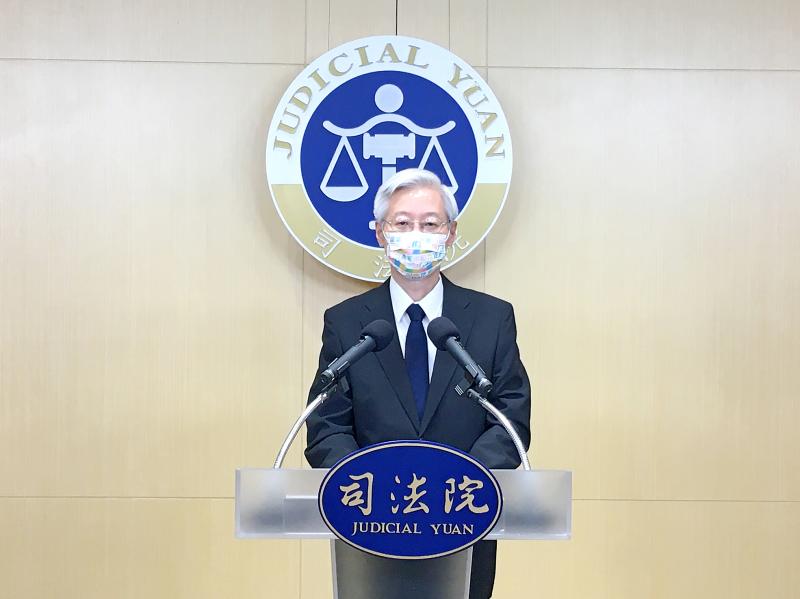A law punishing copyright infringements involving the sale or public distribution of reproductions on optical disks with a minimum six-month prison term is constitutional, the Council of Grand Justices ruled on Friday.
The council issued the ruling after being asked to consider the constitutionality of sentencing someone for selling pirated copies of copyrighted DVDs.
In 2014, a man surnamed Liu (劉) was charged with selling copyrighted Japanese pornographic DVDs for NT$13 each out of a storefront, with police saying that he earned NT$30,000 to NT$40,000 (US$1,074 to US$1,432) per month.

Photo copied by Wu Cheng-feng, Taipei Times
A court ruled that Liu was guilty of contravening Article 91 of the Copyright Act (著作權法), which stipulates that copyright infringements involving reproduction onto an optical disk are punishable by a six-month to five-year prison term, and a fine of NT$500,000 to NT$5 million.
Liu’s lawyer said that the punishment was disproportionate with the crime and harmed his client’s constitutional rights.
Other copyright crimes are punishable by a maximum three-year prison term with no minimum prison term or fine, the lawyer said, questioning the imposition of a minimum term for breaches specifically involving optical disks.
The law says that copyright infringements involving optical disks are prosecutable without complaint, meaning that a defendant faces criminal charges even if they reach an agreement with the copyright holder.
Liu’s lawyer said that application of these laws also harmed Liu’s constitutional rights and requested an interpretation.
However, the council issued Constitutional Interpretation No. 804, which said that criminalizing “reproduction” of copyrighted materials “clearly conforms with the principle of the law,” and that minimum sentencing for pirating disks “does not violate the guarantees of personal freedom and equality stipulated in Article 8 of the Constitution.”
Piracy of optical disks being prosecutable without complaint is also not unconstitutional, it said.
The council said it also recognized that optical disks are no longer the main medium of pirated content, and that lawmakers should amend the law so that it does not fall behind progress.

Taiwan has received more than US$70 million in royalties as of the end of last year from developing the F-16V jet as countries worldwide purchase or upgrade to this popular model, government and military officials said on Saturday. Taiwan funded the development of the F-16V jet and ended up the sole investor as other countries withdrew from the program. Now the F-16V is increasingly popular and countries must pay Taiwan a percentage in royalties when they purchase new F-16V aircraft or upgrade older F-16 models. The next five years are expected to be the peak for these royalties, with Taiwan potentially earning

POSITIVE DEVELOPMENT: Japan and the US are expected to hold in-depth discussions on Taiwan-related issues during the meeting next month, Japanese sources said The holding of a Japan-US leaders’ meeting ahead of US President Donald Trump’s visit to China is positive news for Taiwan, former Japan-Taiwan Exchange Association representative Hiroyasu Izumi said yesterday. After the Liberal Democratic Party’s landslide victory in Japan’s House of Representatives election, Japanese Prime Minister Sanae Takaichi is scheduled to visit the US next month, where she is to meet with Trump ahead of the US president’s planned visit to China from March 31 to April 2 for a meeting with Chinese President Xi Jinping (習近平). Japan and the US are expected to hold in-depth discussions on Taiwan-related issues during the

‘LIKE-MINDED PARTNER’: Tako van Popta said it would be inappropriate to delay signing the deal with Taiwan because of China, adding he would promote the issue Canadian senators have stressed Taiwan’s importance for international trade and expressed enthusiasm for ensuring the Taiwan-Canada trade cooperation framework agreement is implemented this year. Representative to Canada Harry Tseng (曾厚仁) in an interview with the Central News Agency (CNA) said he was increasingly uneasy about Ottawa’s delays in signing the agreement, especially as Ottawa has warmed toward Beijing. There are “no negotiations left. Not only [is it] initialed, we have three versions of the text ready: English, French and Mandarin,” Tseng said. “That tells you how close we are to the final signature.” Tseng said that he hoped Canadian Prime Minister Mark Carney

STAY IN YOUR LANE: As the US and Israel attack Iran, the ministry has warned China not to overstep by including Taiwanese citizens in its evacuation orders The Ministry of Foreign Affairs (MOFA) yesterday rebuked a statement by China’s embassy in Israel that it would evacuate Taiwanese holders of Chinese travel documents from Israel amid the latter’s escalating conflict with Iran. Tensions have risen across the Middle East in the wake of US and Israeli airstrikes on Iran beginning Saturday. China subsequently issued an evacuation notice for its citizens. In a news release, the Chinese embassy in Israel said holders of “Taiwan compatriot permits (台胞證)” issued to Taiwanese nationals by Chinese authorities for travel to China — could register for evacuation to Egypt. In Taipei, the ministry yesterday said Taiwan